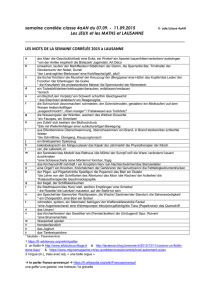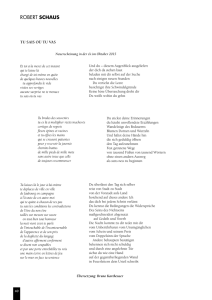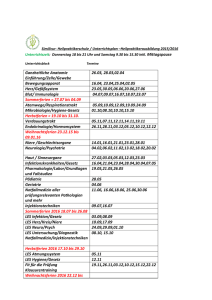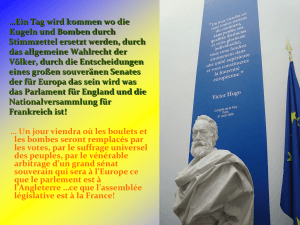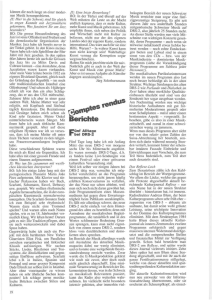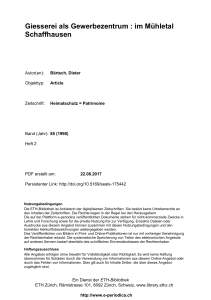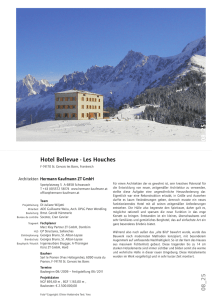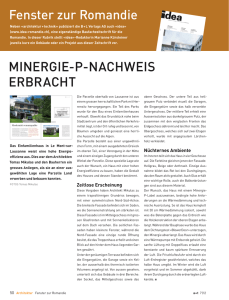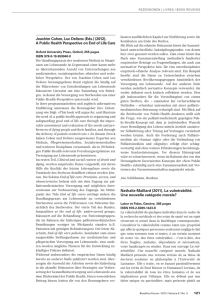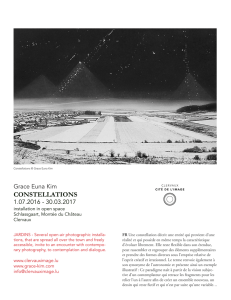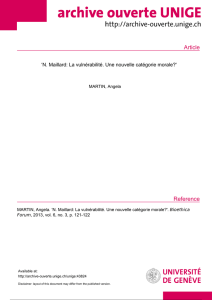barzakh - Berlinale
Werbung
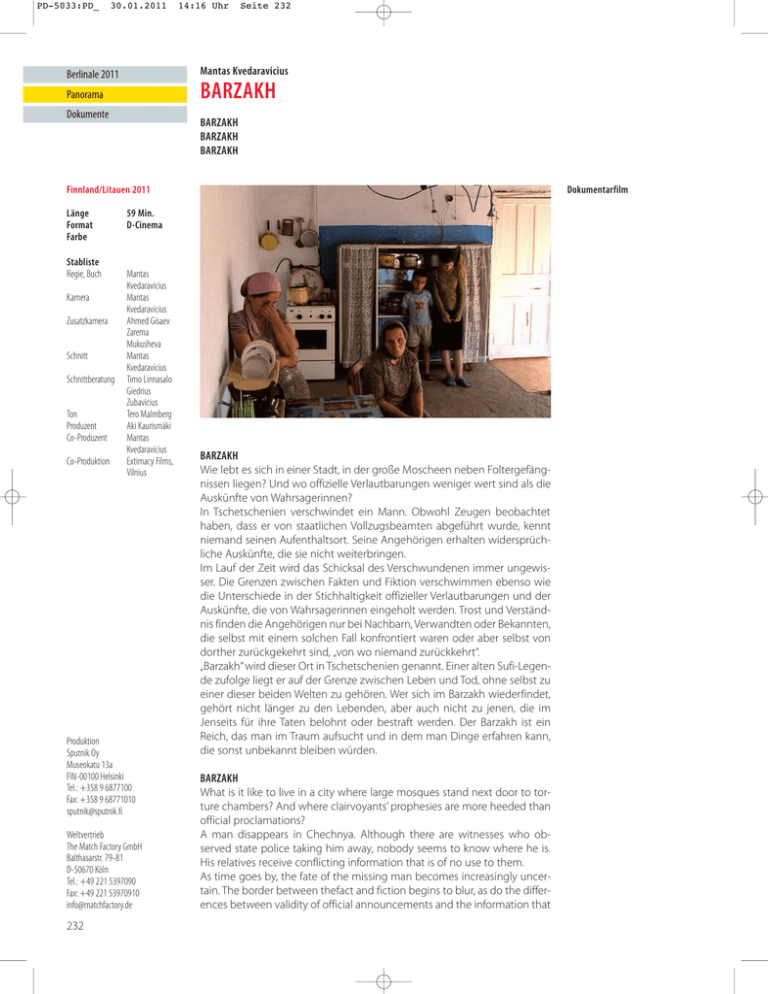
PD-5033:PD_ 30.01.2011 14:16 Uhr Seite 232 Mantas Kvedaravicius Berlinale 2011 BARZAKH Panorama Dokumente BARZAKH BARZAKH BARZAKH Finnland/Litauen 2011 Länge Format Farbe Stabliste Regie, Buch Kamera Zusatzkamera Schnitt Schnittberatung Ton Produzent Co-Produzent Co-Produktion 59 Min. D-Cinema Mantas Kvedaravicius Mantas Kvedaravicius Ahmed Gisaev Zarema Mukusheva Mantas Kvedaravicius Timo Linnasalo Giedrius Zubavicius Tero Malmberg Aki Kaurismäki Mantas Kvedaravicius Extimacy Films, Vilnius Produktion Sputnik Oy Museokatu 13a FIN-00100 Helsinki Tel.: +358 9 6877100 Fax: +358 9 68771010 [email protected] Weltvertrieb The Match Factory GmbH Balthasarstr. 79-81 D-50670 Köln Tel.: +49 221 5397090 Fax: +49 221 53970910 [email protected] 232 Dokumentarfilm BARZAKH Wie lebt es sich in einer Stadt, in der große Moscheen neben Foltergefängnissen liegen? Und wo offizielle Verlautbarungen weniger wert sind als die Auskünfte von Wahrsagerinnen? In Tschetschenien verschwindet ein Mann. Obwohl Zeugen beobachtet haben, dass er von staatlichen Vollzugsbeamten abgeführt wurde, kennt niemand seinen Aufenthaltsort. Seine Angehörigen erhalten widersprüchliche Auskünfte, die sie nicht weiterbringen. Im Lauf der Zeit wird das Schicksal des Verschwundenen immer ungewisser. Die Grenzen zwischen Fakten und Fiktion verschwimmen ebenso wie die Unterschiede in der Stichhaltigkeit offizieller Verlautbarungen und der Auskünfte, die von Wahrsagerinnen eingeholt werden. Trost und Verständnis finden die Angehörigen nur bei Nachbarn, Verwandten oder Bekannten, die selbst mit einem solchen Fall konfrontiert waren oder aber selbst von dorther zurückgekehrt sind, „von wo niemand zurückkehrt“. „Barzakh“ wird dieser Ort in Tschetschenien genannt. Einer alten Sufi-Legende zufolge liegt er auf der Grenze zwischen Leben und Tod, ohne selbst zu einer dieser beiden Welten zu gehören. Wer sich im Barzakh wiederfindet, gehört nicht länger zu den Lebenden, aber auch nicht zu jenen, die im Jenseits für ihre Taten belohnt oder bestraft werden. Der Barzakh ist ein Reich, das man im Traum aufsucht und in dem man Dinge erfahren kann, die sonst unbekannt bleiben würden. BARZAKH What is it like to live in a city where large mosques stand next door to torture chambers? And where clairvoyants’ prophesies are more heeded than official proclamations? A man disappears in Chechnya. Although there are witnesses who observed state police taking him away, nobody seems to know where he is. His relatives receive conflicting information that is of no use to them. As time goes by, the fate of the missing man becomes increasingly uncertain. The border between thefact and fiction begins to blur, as do the differences between validity of official announcements and the information that PD-5033:PD_ 30.01.2011 14:16 Uhr Seite 233 can be obtained from fortune-tellers. The man’s family finds comfort and understanding among neighbours, relatives and others who have gone through the same experience or who have themselves returned from ‘the place of no return’. In Chechnya this place is known as ‘Barzakh’. According to an old Sufi legend, this is a place somewhere between life and death that belongs to neither of these worlds. Anyone who finds themselves in Barzakh is neither in the land of the living, nor are they on the other side among those who are rewarded or punished for their deeds. Barzakh is a realm that can be found in a dream; a place where you can learn things that would otherwise remain unknown. Mantas Kvedaravicius Biografie Geboren 1976 in Birzai, Litauen. Er studierte Kulturanthropologie an der Universität Oxford und arbeitet zurzeit an seiner Dissertation zum Thema Schmerzaffekt an der Universität Cambridge. Er hat in New York Lehrveranstaltungen zu Religion, Gesetzgebung und Politischer Theorie abgehalten und ab 2006 ein Forschungsprojekt zu Folter und Verschleppung im Nordkaukasus geleitet. Zudem ist er Unterwasserarchäologe. BARZAKH ist sein erster Film. Biography Born in Birzai in Lithuania in 1976, he studied cultural anthropology at Oxford University and is currently working on his Cambridge University dissertation on the topic of the effects of pain. He has held seminars in New York on religion, law and political theory, and in 2006 was leader of a research project on torture and deportation in the Northern Caucasus. He is also a marine archaeologist. BARZAKH is his first film. BARZAKH Comment vit-on dans une ville où les grandes mosquées voisinent des prisons et leurs salles de torture ? Et où les annonces officielles ont moins de valeur que les prédictions d’une voyante ? En Tchétchénie, un homme disparaît. Bien que des témoins aient observé qu’il avait été emmené par des fonctionnaires de l’état, personne ne sait où il se trouve. Ses proches reçoivent des informations contradictoires qui ne les mènent à rien. Le sort des disparus devient de plus en plus incertain au fil du temps. Les limites entre les faits et la fiction s’estompent tout comme la différence entre la pertinence des communiqués officiels et les renseignements obtenus auprès d’une voyante. Les proches ne trouvent de la consolation et de la compréhension que chez leurs voisins, leurs parents ou leurs amis qui furent eux-mêmes confrontés à une telle situation ou qui sont même revenus de l’endroit « d’où personne ne revient ». En Tchétchénie, cet endroit est nommé « barzakh ». Selon une vieille légende soufi, l’endroit se situe à la frontière entre la vie et la mort sans faire partie de l’un de ces univers. Celui qui se retrouve au barzakh ne fait plus partie des vivants ni non plus, cependant, de ceux qui sont récompensés ou punis dans l’au-delà pour leurs faits. Le barzakh est un royaume où l’on se rend en rêve et où l’on peut vivre des choses qui resteraient autrement inconnues. Biographie Né en 1976 à Birzai, Lituanie. Etudie l’anthropologie culturelle à l’université d’Oxford et travaille actuellement à sa thèse (sur le thème de l’affect de la douleur) à l’université de Cambridge. A tenu à New York des cours sur la religion, la législation et la théorie politique et dirigé à partir de 2006 un projet de recherche sur la torture et les enlèvements dans le Nord du Caucase. Pratique entre autres l’archéologie sous-marine. BARZAKH est son premier film. 233
